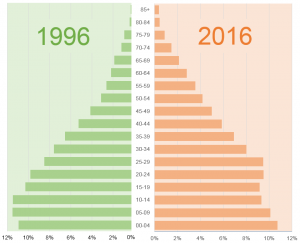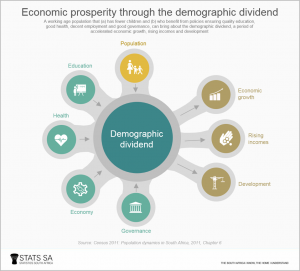
Africa Rising: Growth in Africa through steadfast statistics
The continent is working towards attaining “the Africa we want”. Key to achieving this goal, through the Sustainable Development Goals and Agenda 2063, are quality and relevant statistics.
African Statistics Day is celebrated each year on 18 November. Africa celebrates this day to raise awareness of the importance of statistics in all aspects of socioeconomic life. The theme for this year is:
“Strengthening economic statistics for regional integration, structural transformation and sustainable development”.
This year the day champions economic statistics; however, the value of population statistics in making a difference to lives on the continent cannot be underestimated.
Population is not simply a problem of numbers. The growth in Africa’s population in the last decade has not been accompanied by the necessary structural transformation, nor has it translated into equitable human development and improved livelihoods.
The demographic dividend
Economics and population issues are deeply intertwined. A country planning for a brighter future needs to understand the linkages between population changes and economic growth. One such linkage takes the form of what is known as the demographic dividend: a period of rapid economic growth triggered by a shift in population structure.
A demographic dividend happens when a nation enters a period in which those of working age (15–64 years) begin to outnumber the young. With more individuals driving the economy and with fewer children to support, resources are freed up, allowing investments to flow into welfare, infrastructure and economic development.
The “Asian Tigers”, such as Korea, Hong Kong, Taiwan and Singapore, took advantage of this population shift that contributed to years of accelerated economic growth and rising per capita incomes.
What about South Africa? Take a close look at the two population pyramids below. Notice how South Africa’s population in 1996 is slightly more bottom heavy (i.e. younger) than in 2016?
The average age of the population in 1996 was 22 years, with 34% of the population aged 0–14. In 2016, the average age had climbed to 25 years, with 30% of the population aged 0–14. The proportion of those of working age increased from 60% to 66% over the same period.
One of the reasons for this is that South Africans are having fewer babies. Falling fertility rates create the fertile ground from which the demographic dividend can emerge.
But there is a catch. Even with this population shift, the demographic dividend is not guaranteed. A second element is needed: the commitment of a country to ensure that the expanding working-age group is healthy, employable and productive. This is done by (a) ensuring that those entering the working-age group are healthy and well educated, and (b) ensuring that the economy creates sufficient employment.
A good healthcare system contributes to a productive workforce. Policies developed should invest heavily in improving infant care, child nutrition, adolescent health, and reproductive health. Education is also key. A young population that is well educated will be able to meet the demand for skills in a growing economy. Policies should be successful in improving the access to, and the quality of, primary, secondary and tertiary education.
Good governance, which includes the rule of law and initiatives to reduce corruption, builds trust amongst the population and outside investors. Sound economic policies that promote growth contribute to creating jobs that can be filled by those reaching working age.
For any nation that is on the cusp of the demographic shift mentioned above, the key question to consider is whether it is successfully laying the groundwork to transform this shift into a demographic dividend. Is it providing good quality education to its youth? Is it building an economy that will ensure large-scale employment? Both economic and demographic statistics have a major role to play in answering these questions.
Bringing the conversation closer to home: International Population Conference 2017
Statistics South Africa (Stats SA) sought to bring discussions closer home on key issues of population and development in bidding to host the 28th International Population Conference (IPC) of the International Union of the Scientific Study of Population (IUSSP) to be hosted in Cape Town in 2017. This is the first time in the Paris-based IUSSP’s 88-year history that the International Population Conference will be held in sub-Saharan Africa.
The conference brings together people from all over the world who are at varying stages of their careers, from senior researchers, practitioners and policymakers to students. It provides opportunities to network with experts in their field, showcase research and move the population debate forward. Participants will be exposed to recent scientific research on problems the world is currently facing.
The conference covers 19 diverse themes dealing with international and regional population issues.
Under theme 19, Population and Policy Challenges in Africa, the South African National Organising Committee will host Africa Population Day from 31 October to 1 November 2017. The eight topics to be covered are:
- Africa’s youth beyond 2030 – challenges and opportunities
- African families: continuity and transformation
- Assessment of civil registration and vital statistics systems
- Challenges in overcoming poverty, inequality and vulnerability
- Fertility transitions in Africa
- Health and mortality: non-communicable diseases as an emerging concern in the epidemiology of Africa
- Meeting the challenge of producing skills for a 21st century African labour force
- Migration and urbanisation
To be part of the change, join in the conversation and debate at the International Population Conference.
For more information visit the IPC 2017 website: ipc2017capetown.iussp.org
Facebook: IPC2017
Twitter: IPC2017



